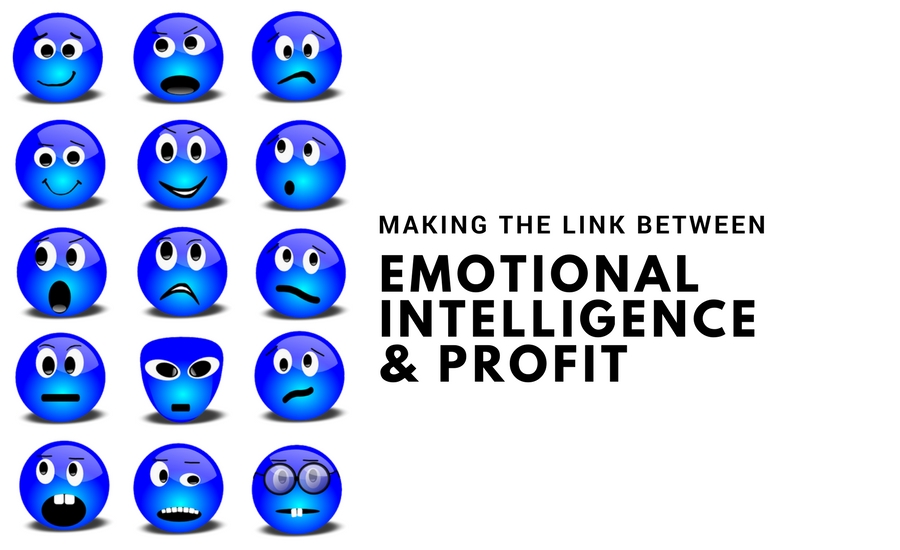Linking Emotional Intelligence and Profit

I first became aware of the idea of emotional intelligence when the buzz around Daniel Goleman’s book hit the street in 1995. I have been wanting to write something on this for almost that long, because in working with teams and employees individually, I see over and over how important both cognitive and emotional intelligence is. Here is an example:
It's 9:45 a.m. on a Tuesday and I am sitting in applicant interviews with a resigned business owner. Resigned because we are conducting interviews for a new project manager and he isn’t happy with what we have seen so far. We have seen four people already, number four just left, we have two more to go, and we're looking at the clock just waiting to get this done.
As each one left, we had a brief conversation about how we might be able to make that applicant work, not realizing how our whole position was coming from settling for less than what we really needed and wanted. We didn’t see our blind spot until number five walks in and seriously gets my attention. I sit up straight. I am immediately impressed by his smile, gait, posture, eye contact, and energy level. As he sits down, he slides me his resume. He hasn’t even said more than his name and I already have a strong intuition this is our guy. I look over at the owner, and he’s looking at me with a look on his face that tells me the applicant got his attention too. The next few minutes will be very interesting. We have over a million in sales about to go into WIP and we need a solid, authentic, grounded, and experienced person to run the work. Someone that we can count on no matter what.
Here is the challenge I see over and over again. How do you know, how do you discern the person sitting in front of you is going to be that rock star performer you really want and need? We look at resumes, we talk with them on the phone, we ask questions, listen to their response, then meet with them and see what they are like in person. Sometimes we have them solve some work-related problem, or sometimes we have them write up a proposal of their first six months to a year. It’s becoming more common to give key applicants a personality test, and some of those tests include emotional intelligence indicators. But at no time ever have I ever seen a test given just for emotional intelligence. I have heard and participated in conversations regarding applicants skills, talents, etc, but rarely have I heard conversations about an applicant's EI.
The truth is, we hire based on skill set and experience; we sometimes consider their personality and character. But we rarely put together the fact that many of the needed professional skills live in the EI world. Consider these needed skills:
Self-Awareness: Knowing one’s emotions, strengths, weaknesses, drives, values and goals and recognize their impact on others while using gut feelings to guide decisions. Have you ever had the project manager or estimator that gathers their self esteem by pleasing others? Next thing you know, their margins are slipping because they give free work to the homeowners…but their customers love them.
Self-Regulation: Manage or redirect one’s disruptive emotions and impulses and adapt to changing circumstances. What about the key employee (PM, Estimator, etc) that has all the right skills and experience….but they can’t get along with anyone. They blow up relationships with customers or team members. And it’s always the another’s fault. Another thing here is time management and scheduling of projects. High functioning estimators and project managers have excellent time management and project management scheduling skills that allow them to expand their workload like an accordion when needed. If the estimator or manager doesn’t have these skills, they get overwhelmed, and from their point of view that they have too much work, and you need to hire more people. Sound familiar?
Social Skills: Manage others' emotions to move people in the desired direction.
Empathy: Recognize, understand, and consider people’s feelings when making decisions.
Motivation: Motivate oneself and others to achieve for the sake of achievement.
I put these last three together because they are critically important for any key leader or manager who has one of more people reporting to them. The best performance, the kind of performance where employees are achieving their goals, exceeding their goals, and excited because they are having breakthroughs in their accomplishments, comes from a level of productivity that lives somewhere between people doing what they are inspired to do and what they are committed to do.
Teams that reach that level of productivity are highly successful and highly profitable. In order to support your teams in reaching their max potential, you need key managers and key employees who have these social, empathy, and motivation skills. This kind of intelligence allows for the kind of understanding, communication, and coaching with individuals to build on their existing skills, and unleash their potential. Without this, employees resist support, and experience education and empowerment as a threat. Managerial efforts typically fall to management by force, or management through fear of some kind of punitive action, or offers of financial reward. Best case: those management styles typically meet with marginal success, as long as the effort is maintained. Worst case, owners and managers become frustrated, stressed, and exhausted.
Bottom line is if you want rock star employees, pay attention to their skills, experience, and their mood, energy level, ability to be coachable, capacity for learning, and willingness to give and keep their word on challenging outcomes and results. Ultimately, you want "can do, I can make it happen, I will make it happen" people. Those folks will have strong self esteem, self worth, and integrity, with the history of results to back that up.
Looking for a reprint of this article?
From high-res PDFs to custom plaques, order your copy today!





